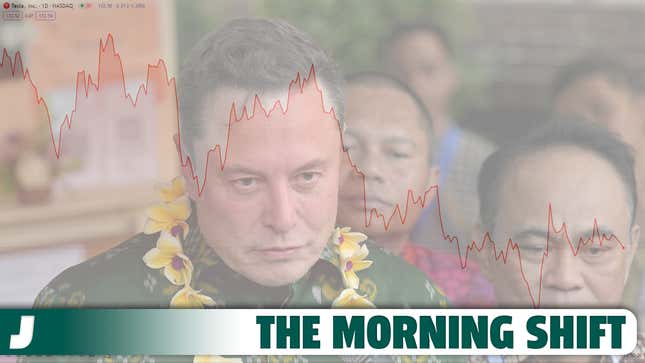
In This Story
Institutional shareholders at Tesla are dropping the automaker’s stock because they feel its days of huge growth are in the past. Tesla’s shares are down just about 30% this year, and the stock has fallen by over 50% since its high in 2021 whipping away nearly $600 billion in market value. Ouch.
Tesla and CEO Elon Musk have struggled as EV competition gets stronger on all fronts, causing sales to fall. The Austin, Texas-based automaker missed first-quarter expectations, and Musk has been wishy-washy on future products. From Reuters:
“It started to feel like the fundamentals were becoming detached from reality,” said John Belton, a portfolio manager at Gabelli Funds whose firm sold its entire stake of 65,900 shares - acquired in early 2022 - in the first quarter of the year. “We think the stock works best when there are auto company fundamentals that justify the stock price.”
Tesla’s nearly 14-fold increase in its stock the last five years has conditioned investors to hold on during periods of adversity and accept valuations that are more in line with technology companies than carmakers. This time however, even some of the company’s diehard believers have become skeptical that the same kind of expansion lies ahead and think Tesla’s shares have become too risky. Tesla did not respond to a request for comment on this story.
Of the 18 mutual funds tracked by Morningstar that have held Tesla shares since 2019, 10 reduced their positions in the last quarter, with four slashing their stakes by 15% or more, Morningstar data showed. Only five added shares.
That doesn’t mean Wall Street has written off the stock. Nineteen analysts tracked by LSEG now have either a “buy” or “strong buy” rating on Tesla, up from 17 in February. The average price target among 49 analysts tracked stands at $178.95, about 1.5% more than the stock’s closing price on Monday.
Not all investors see it that way. Ross Gerber’s investment first, Gerber Kawasaki Wealth & Investment Management, bought half a million shares over 10 years ago, but they have been steadily selling that position this year.
“I think the story is over, is the best way to say it,” said Gerber, who has whittled his position down to around 300,000 shares.
Gerber’s complaints range from Tesla’s public relations department, which he believes receives insufficient funding, to what Gerber calls Musk’s distractions by political and cultural issues.
“Over the last year and a half, Elon’s personal quests based on the way that he sees the world have superseded the interests of Tesla and its shareholders,” Gerber said.
Gerber believes the shares, which closed on Monday at $176.29, are fairly valued at $100, some 40% less than their current value, as long as Musk stays at the helm. He expects to give part of the remainder of his stock to charity to allay the tax consequences of selling, or use them to sell put options, which allows him to raise income without incurring tax penalties.
Despite all this, Tesla is still the world’s most valuable automaker with a $560 billion market cap. Second place is Toyota, the world’s biggest automaker by volume, at about $334 billion.
Tesla, however, trades at approximately 64 times future earnings, as of Tuesday morning, a multiple that exceeds the valuations of some tech high-fliers. Artificial intelligence darlings Nvidia, opens new tab and Super Micro Computer, opens new tab, for instance, trade at 37.8 and 23.2 times earnings, respectively. Other automakers are valued far more conservatively. General Motors, opens new tab trades at 4.7 and Ford, opens new tab trades at 6.4 forward earnings, while Toyota trades at 10.1.
Bullish investors justify Tesla’s valuation with a long list of reasons, pointing to its technology and fervent fan base. More recent causes for optimism have been the company’s continued push into fully-autonomous driving and in-roads into China.
“The Street is looking through this painful transition period for the long-term growth story to emerge for Musk & Co, with (self-driving) a key ingredient in that recipe for success,” said Dan Ives, an analyst at Wedbush Securities who has a $275 price target for the stock.
People who make a lot more money than I do seem to be really mixed on what will happen to Tesla’s stock. Listen, I’m not a stock expert, but uncertainty is never a good thing when it comes to Wall Street.
A version of this article originally appeared on Jalopnik’s The Morning Shift.